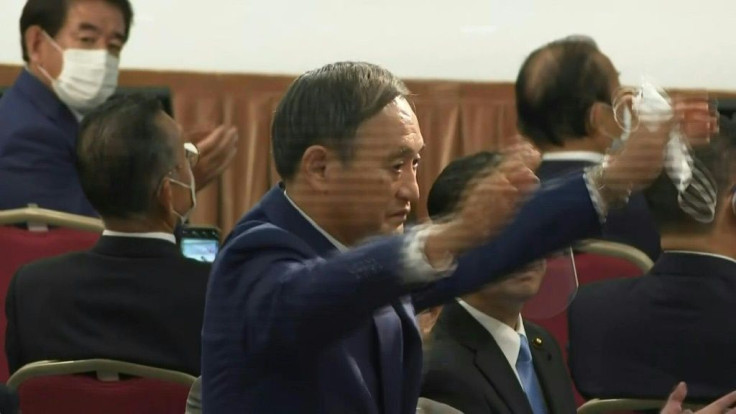Who Is Yoshihide Suga? Japan's New Prime Minister Rose From Humble Origins

KEY POINTS
- Abe said last month he will resign due to illness.
- Suga is seen as a pragmatic backroom negotiator, but loyal to Abe's policies
- Suga also pledged to hike the minimum wage, promote agricultural reforms and boost tourism.
Update, Wednesday, Sept. 16, 6:30 a.m.:
Yoshihide Suga officially elected Japan's new prime minister on Wednesday, according to AFP, rep[lacing Shinzo Abe, who resigned for health reasons. Sugawon an easy victory in a parliamentary vote, where his ruling Liberal Democratic Party (LDP) holds a commanding majority.
Our original story begins here:
Japan’s ruling party has elected Chief Cabinet Secretary Yoshihide Suga, 71, to succeed Shinzo Abe as prime minister of the world’s third largest economy.
The Liberal Democratic Party, or LDP, was forced to name a new leader after Abe said last month he will resign due to illness.
Suga, who comes from a humble background, easily defeated his two principal rivals for the top spot, Defense Minister Shigeru Ishiba and former Foreign Minister Fumio Kishida. Suga received 377 votes from LDP lawmakers, while Kishida received 89, and Ishiba, 68.
Suga undoubtedly will be formally elected as prime minister at an extraordinary Diet session (the national legislature) Wednesday since the ruling LDP controls the House of Representatives (the lower chamber) and enjoys a majority in the House of Councilors (upper chamber).
"We must inherit and promote the efforts [against the COVID-19 pandemic] that Prime Minister Abe has made so that people can overcome the crisis and live a safe and stable life," Suga said. "I'll create a Cabinet that works for [the] people.
"Since there is a change of prime minister, I will venture the promotion of people [in my Cabinet] who are fit to carry out my policies," he continued. "It is important to rebuild the economy while also containing the coronavirus at the same time.”
Suga has said he will continue Abe’s economic policies, namely monetary easing, fiscal stimulus, and structural reforms. He has also pledged to hike the minimum wage, promote agricultural reforms, and boost tourism.
“As a representative of our country, he is a man of pre-eminent political skill and ability to get things done,” stated Hiroaki Nakanishi, head of the Keidanren business federation.
With foreign policy, again Suga seeks to adhere to Abe’s mandate to maintain close trade and security ties with longstanding ally U.S., while seeking to keep stable relations with China.
Suga will eventually have to call a snap election, but with the pandemic raging it’s unclear when that can safely occur.
Suga was born in 1948 to a family of strawberry farmers in rural Akita Prefecture in extreme northern Japan – a world away from the elites who have tended to rule the nation.
He will be the first LDP leader who neither belonged to a faction within the party, nor came from a political dynasty.
“I am the son of a farmer from Akita,” Suga said. “I started from nothing, with no political connections, but the LDP, with all its history and traditions, has made me its leader. I think that’s a symbol of what Japan is as a democratic nation.”
Suga graduated from Tokyo's Hosei University and was eventually elected to the Yokohama City Council in 1987. By 1996, Suga was elected to Japan's Diet for the first time.
In 2005, Prime Minister Junichiro Koizumi named Suga senior vice minister of internal affairs and communication. In 2006, Prime Minister Abe promoted Suga to three cabinet posts. By 2012, Suga rose to become Chief Cabinet Secretary, an influential position.
“Japan is not a country with revolutionary reform taking place very often,” said Christina L. Davis, director of the Program on U.S.-Japan Relations at Harvard told the New York Times. “Especially in times of crisis and uncertainty, [Suga] being seen as a stable crisis manager could be an asset.”
© Copyright IBTimes 2025. All rights reserved.





















